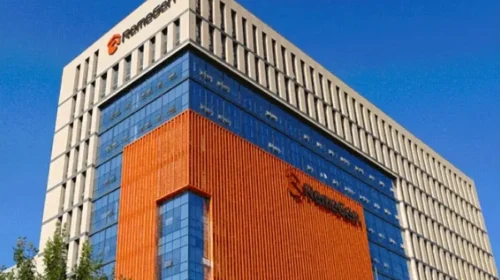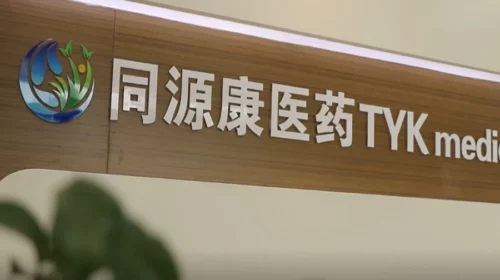Kintor shares plunge after hair-loss drug flops in clinical trials

The company’s drug has failed to show a significant hair-boosting effect in Phase III trials, dashing investors’ hopes for a ground-breaking treatment for baldness
Key Takeaways:
- The disappointing test results triggered a 46% share plunge over five trading days, leaving prices 98% below their peak
- The company may face financing challenges in future as its cash on hand may only last for two years at the current burn rate
By Molly Wen
Drug research is widely known to be a gamble, with pharmaceutical firms as the high rollers. One Chinese company placed a big bet on developing a hair-loss treatment but has ended up playing a losing hand.
Pharma companies invest heavily to produce new drugs, with unpredictable outcomes. R&D for a novel drug costs around $2.6 billion on average, according to the journal Nature. Development takes around a decade with a success rate of less than 10%. In this high-stakes game, many companies run two or three key pipelines to insure against a run of bad luck that could wipe out investor confidence.
Kintor Pharmaceutical Ltd. (9939.HK) has experienced the highs and lows of drug innovation. The company became a sensation for a time with a promising Covid drug, but the test results were mixed, and another of its products has now suffered an R&D setback. Kintor announced last Monday that its drug candidate for male hair loss had not significantly outperformed a placebo in 24 weeks of Phase III trials, signaling a dead end in the development effort.
KX-826 (Fretaine) for male androgenic alopecia (AGA) represents a key Kintor pipeline, making the fastest progress among the company’s drugs under development.
The drug was the first androgen receptor (AR) agonist to enter Phase III trials as a hair-loss treatment. This type of drug stops hormones such as testosterone from binding to cell receptors, and the prospect of a potent new weapon against thinning hair had raised high hopes among investors.
The test results, released before the market open, came as a bitter blow. Kintor’s share price plunged by more than 30% at the start of trade and closed the day with a loss of 31.9%. The investor exodus carried on after the initial shock. The share price fell 46% to HK$1.83 over the five days from Nov. 27 to Dec. 1, leaving the stock languishing 98% below the peak of HK$85 set in September 2021.
Founded in 2009, the company is focused on producing innovative drugs to treat conditions involving androgen receptors. Its core product is Proxalutamide, a small-molecule AR antagonist that targets prostate cancer and breast cancer. However, marketing approval has yet to be granted.
New drugs can frequently fall short of expectations. But this is not the first Kintor drug to look encouraging in Phase II trials only to stumble at the Phase III stage. No wonder investors are disillusioned.
Soon after the pandemic broke out, the company began to explore the use of Proxalutamide as a Covid drug. Kintor said pre-trial research and drug tests in Brazil on severe Covid cases demonstrated remarkable effectiveness for patients with a range of mild to very severe symptoms. The company’s share price rose rapidly for a while in anticipation of an anti-Covid success story.
However, interim results from a Phase III clinical analysis at the end of 2021 came with a plot twist. Used on non-hospitalized Covid sufferers, Proxalutamide demonstrated no statistically significant impact. The company’s share price collapsed by 85% as a result. But when the final data for the Phase III trial appeared in April 2022, the company said the protection rate for patients who had taken the drug for more than seven days reached 100%. The stock price doubled on the unexpected outcome.
However, medical regulators around the world have not endorsed the drug, aside from a license in Paraguay in 2021 for emergency use against Covid.
Later, another clinical trial for Proxalutamide also hit a snag. The company announced in March that Chinese tests had shown no significant improvement in survival time for patients with prostate cancer that had spread to other parts of the body, when the product was administered as a single drug. A Phase III clinical trial of the drug in combination with abiraterone for the same condition was underway and should be completed in the second half of 2023 or the first half of 2024, the company said.
A bumpy road ahead
Despite the disappointing data for its alopecia drug, the company was not ready to admit defeat. Chairman and CEO Tong Youzhi told the media the company would conduct another Phase III trial that might involve a higher dose or a different control group. Only one of the company’s three core products has been spared negative findings so far, an AR compound (GT20029) for the treatment of male hair loss and acne. That drug is undergoing Phase II trials, with top-line data due in the first quarter of next year.
However, can Kintor afford to fund another Phase III clinical trial with its available cash, or will it suffer more R&D obstacles? The corporate earnings statement shows cash, cash equivalents and fixed deposits totaled 702 million yuan ($98 million) as of the first half of 2023 plus 90 million yuan of unused financing. The net loss for the period shrank 59% to 212 million yuan, as R&D spending fell just over 64% to 165 million yuan. Cash on hand may only be enough to support operations for the next two years at the current spending rate.
Kintor has stayed active in the capital market since listing on the Hong Kong Stock Exchange in 2020 with proceeds of HK$1.86 billion ($238 million). The company has carried out multiple private placements, reducing the holdings of its founding team.
After producing what looked to be a promising Covid drug, the company raised about HK$1.17 billion in May 2021 at HK$64.5 per share, while co-founder Guo Chuangxin sold 3.7 million Kintor shares. In 2022 came two rounds of private placements amounting to HK$800 million worth of shares. Guo and Tong reduced their holdings by 3 million shares and 8.53 million shares respectively.
Future financing efforts will probably be a challenge, after the recent R&D rollercoaster. The company’s price-to-book (P/B) ratio is only 0.57 times, lagging the 3.35 times for Cutia Therapeutics (2487.HK), an unprofitable biomedical company that is also working on hair-loss drugs. Let’s wait and see whether the company can turn things around with renewed clinical trials for Fretaine.
Have a great investment idea but don’t know how to spread the word? We can help! Contact us for more details.
The Bamboo Works offers a wide-ranging mix of coverage on U.S.- and Hong Kong-listed Chinese companies, including some sponsored content. For additional queries, including questions on individual articles, please contact us by clicking here.
To subscribe to Bamboo Works free weekly newsletter, click here
Tags:
Kintor Pharma, Cutia Therapeutics, Fretaine, Hair loss drug, Proxalutamide, Covid drug
[W1]公司名称错误






